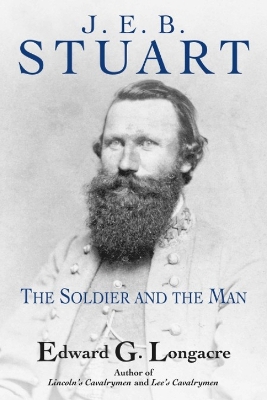Fifteen years have passed since the publication of the last biography of Jeb Stuart. Several appeared during the last century lauding his contributions to Confederate fortunes in the Eastern Theater. Each follows a familiar tradition established by hero-worshipping subordinates portraying its subject as a model of chivalric conduct with a romantic's outlook on life and a sense of fair dealing and goodwill, even toward his enemy. J. E. B. Stuart: The Soldier and the Man, by award-winning author Edward Longacre, is the first balanced, detailed, and thoroughly scrutinized study of the life and service of the Civil War's most famous cavalryman. Long known to scholars and history buffs alike as The Beau Sabreur of the Confederacy, James Ewell Brown Stuart of Virginia was possessed of many gifts, personally and professionally, and led the Army of Northern Virginia's cavalry to the all-but-complete satisfaction of his superiors. Stuart, insisted Robert E. Lee, never brought me a piece of false information. Being human, Stuart also under-performed. On occasion, he underestimated his opponents, took unnecessary risks with his habitually understrength command, failed to properly discipline and motivate his troopers, and was prone to errors both strategic and tactical. These flaws were evident during the Gettysburg Campaign, when his wayward route to the battlefield deprived Lee of the ability to safely negotiate his path toward a climactic confrontation with the Union Army of the Potomac. Because of his outsized wartime reputation-one embellished in the century-and-a-half since-most of Stuart's errors have passed virtually unnoticed or, when addressed, have been excused or explained away in some fashion. Longacre's study is based on hundreds of published works, archival sources, and newspapers. He probes not only Stuart's military career but elements of his character and personality that invite investigation. Even the man's fiercest partisans admitted that he was vain and inordinately sensitive to criticism, with a curious streak of immaturity-at times the hard-edged veteran, at other times a devotee of the pageantry of war, given to affectations such as ostrich-plumed hats, golden spurs, and the headquarters musicians who accompanied him on the march. Ever motivated by appeals to vanity, he curried the patronage of powerful men and responded readily to the attentions of attractive women even though by 1861, he was a long-married man. Personal flaws and limitations aside, Stuart was popular with his officers and men, beloved by members of his staff, and considered by the people of his state and region the beau ideal of Confederate soldiery. The distinction endures today. Longacre's J. E. B. Stuart is an attempt to determine its validity. AUTHOR: Edward G. Longacre is a retired historian for the Department of Defense. He is the recipient of a Ph.D. from Temple University and taught military history at the University of Nebraska and the College of William and Mary. Ed is the author of 30 books, all but one of which covers the Civil War. The Cavalry at Gettysburg won the Fletcher Pratt Award, his biography of Wade Hampton III, Gentleman and Soldier, received the Douglas Southall Freeman History Award, and his study of First Bull Run, The Early Morning of War, received the Dr. James I. Robertson Jr. Literary Prize. He lives with his wife, two dogs, and two cats in Newport News, Virginia, on ground maneuvered over during the 1862 Peninsula Campaign. 38 images, 12 maps
- ISBN13 9781611216806
- Publish Date 8 March 2024
- Publish Status Active
- Publish Country US
- Imprint Savas Beatie
- Format Hardcover
- Pages 448
- Language English
